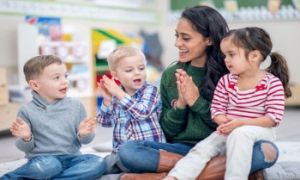

Preparing children for the leap into formal schooling involves more than academic knowledge—it means supporting their holistic development across cognitive, social, emotional, and physical domains. This checklist supports educators and families in identifying foundational skills and strengths, in alignment with the Early Years Learning Framework (EYLF) outcomes and contributing toward Quality Improvement Plan (QIP) goals such as practice refinement, documentation, and improved transition planning.
Here’s a breakdown of developmental milestones for children aged 2 to 3 years, along with examples of how they link to the EYLF.
Here’s how Physical Development, Cognitive & Language Development, and Social & Emotional Development for 12 to 24 months align with the Early Years Learning Framework (EYLF).
Attachment theory is a key concept in developmental psychology that examines the importance of early relationships between children and their Educators.The following article provides information on What Is Attachment Theory, Key Aspects of Attachment Theory, Significance of Strong, Secure Attachments, Practical Strategies For Attachment Theory, How Lack Of Attachment Can Impact On Development and more.
Caring for babies in their gross motor development stage involves encouraging activities that promote strength, coordination, and balance. The following article provides information on Strategies For Supporting Babies In Their Gross Motor Development, How To Encourage Sitting Unsupported, Structured Activities To Encourage Babies Gross Motor Development, and more.
Metacognition refers to the awareness and understanding of one's own thought processes. The following article provides information on Key Aspects, Benefits Of Metacognition, How To Introduce Metacognition To Preschoolers, Activities For Metacognition and more.
Introverted children have unique qualities and strengths that set them apart from their extroverted peers. The following article provides information on Characteristics of Introverted Children, Nurturing an Introverted Child, Supporting Introverted Children in Social Situations, Benefits of Being Introverted, For Young Intorverted Children, Introverted Children In Social Situations, Building Relationships With An Introverted Child and more.
The Words Grow Minds Professional Learning Course is a free course designed to support and upskill Educators working with very young children and their families. It aims to support Educators across the sector in deepening their knowledge of early childhood development.
 Open ended questions cannot be responded to with one word answers such as yes or no. These types of questions enables a child to provide… Read More
Open ended questions cannot be responded to with one word answers such as yes or no. These types of questions enables a child to provide… Read More
 During your child’s preschool years, an important milestone begins to emerge. This is the development of pre-writing skills. Pre-writing skills are used to encourage, develop… Read More
During your child’s preschool years, an important milestone begins to emerge. This is the development of pre-writing skills. Pre-writing skills are used to encourage, develop… Read More
 Open ended materials enables children to play freely. They are objects that have no rules to follow, use or function. Raw materials that can be… Read More
Open ended materials enables children to play freely. They are objects that have no rules to follow, use or function. Raw materials that can be… Read More
 An Acknowledgment of the Country is a way of showing respect for the Traditional Owners and can be given by both non-Indigenous people and Aboriginal… Read More
An Acknowledgment of the Country is a way of showing respect for the Traditional Owners and can be given by both non-Indigenous people and Aboriginal… Read More
 Language plays an important role in a child’s development. It enables a child to communicate effectively with their family, learn at school, socialize with friends,… Read More
Language plays an important role in a child’s development. It enables a child to communicate effectively with their family, learn at school, socialize with friends,… Read More
 Like adults, children have to deal with their own stress in life. Moving house, starting a new school, preparing for a new sibling - these are… Read More
Like adults, children have to deal with their own stress in life. Moving house, starting a new school, preparing for a new sibling - these are… Read More
 Playdough is such a versatile material. It provides numerous benefits to children as they manipulate it, it is safe and soothing and provides children with… Read More
Playdough is such a versatile material. It provides numerous benefits to children as they manipulate it, it is safe and soothing and provides children with… Read More
 Teaching children about sustainability enables them to appreciate and respect the natural environment. Early childhood services can provide meaningful hand on learning experiences in order… Read More
Teaching children about sustainability enables them to appreciate and respect the natural environment. Early childhood services can provide meaningful hand on learning experiences in order… Read More
 Recycling is an important concept that teaches children to care for the environment. It encourages children to be responsible and show a growing appreciating for… Read More
Recycling is an important concept that teaches children to care for the environment. It encourages children to be responsible and show a growing appreciating for… Read More
 When children apply paint to paper, glue things together, or pound a lump of clay, they experiment with colour, shape design and texture.
Read More
When children apply paint to paper, glue things together, or pound a lump of clay, they experiment with colour, shape design and texture.
Read More

Effective communication is key to building positive relationships with children and facilitating their learning. However...
See more...
The following provides a list of outdoor activities for babies and toddlers that promote sensory...
See more...
Routines and rituals are an integral aspect of growing up. They not only teach young...
See more...© 2009-2025 Aussie Childcare Network Pty Ltd. All Rights Reserved.
